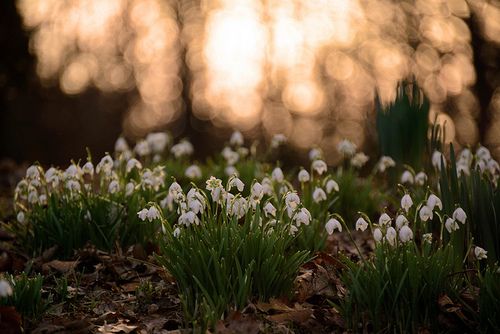Imbolc/Candlemas February 1-2
Imbolc, in the Celtic seasonal calendar, marks the beginning of the lambing season and signals the beginning of Spring and the stirrings of new life.

Imbolc has traditionally been celebrated on 1 February. However, because the day was deemed to begin and end at sunset, the celebrations would start on what is now 31 January. It has also been argued that the timing of the festival was originally more fluid and based on seasonal changes. It has been associated with the onset of the lambing season—which could vary by as much as two weeks before or after 1 February—and the blooming of blackthorn.
Holy wells were visited at Imbolc, and at the other Gaelic festivals of Beltane and Lughnasa. Visitors to holy wells would pray for health while walking 'sunwise' around the well. They would then leave offerings; typically coins or clooties (see clootie well). Water from the well was used to bless the home, family members, livestock and fields.
It is time to let go of the past and to look to the future, clearing out the old, making both outer and inner space for new beginnings. This can be done in numerous ways, from spring cleaning your home to clearing the mind and heart to allow inspiration to enter for the new cycle.
It's a good time for wish-making or making a dedication.
I dedicate my wish to a friend that has been in tears over a problem she feels is out of her control. I've sent her protective light and love to help her know, deep within, that she is safely wrapped up and surrounded by positive energy. My message to her, 'You will be okay'.
((( 💗 )))
As part of your celebrations, light candles and make wishes for your family and friends - the simplest form of candle magic.
Candle magic is one of the simplest forms of spell casting. Considered sympathetic magic, it's a method which doesn’t require a lot of fancy ritual or expensive ceremonial artefacts. In other words, anyone with a candle can cast a spell. After all, remember when you were a child and you made a wish before you blew out the candles on your birthday cake? Same theory, only now instead of just hoping, you're declaring your intent.
If you think about it, the birthday-candle ritual is based on three key magical principles:
- Decide on a goal
- Visualize the end result
- Focus your intent, or will, to manifest that result
Typically, a short taper candle or a votive candle work the best.
You should always use a brand new candle for spell work.
Typically, colour correspondences for candle magic are as follows:
Red: Courage and health, sexual love and lust
Pink: Friendship, sweet love
Orange: Attraction and encouragement
Gold: Financial gain, business endeavours, solar connections
Yellow: Persuasion and protection
Green: Financial gain, abundance, fertility
Light Blue: Health, patience and understanding
Dark Blue: Depression and vulnerability
Purple: Ambition and power
Brown: Earth-related or animal-related workings
Black: Negativity and banishment
White: Purity and truth*
Silver: Reflection, intuition, lunar connections
* Note that in many Pagan traditions, it is acceptable to use a white candle in place of any other colour.
After you've selected a candle, you'll want to oil it or dress it before burning. This is a method by which you'll establish a psychic link between you and the candle itself. In other words, you're charging the candle with your own energy and personal vibrations, and projecting your intent into the wax before you burn it. To dress a candle, you'll need a natural oil -- many practitioners like grapeseed because it has no smell.
Another option is to use special candle magic oils from one of the metaphysical supply stores. Begin at the top of the candle, and rub the oil down to the middle. Then, begin at the base of the candle and rub the oil up towards the middle, ending where the first coating of oil left off.
If your working calls for herbs to be used as well, roll the oiled candle in the powdered herbs until it is coated all the way around.
You should give your chosen candle a basic cleansing, before dedicating it to the use of a magical spell."
The most basic form of candle magic uses a piece of coloured paper that matches the intent of your candle. Decide what your goal is, and write it on the piece of paper. Write down your intent -- something like 'Protect... ....'. In some traditions, you would write your intent in a magical alphabet, such as Theban or Enochian. As you write down your goal, visualize yourself achieving that goal. Think about the different ways in which your goal might manifest.
Once you've written down your goal, fold the paper, concentrating on your intent the whole time. Some people like to say a small incantation as they do this -- if you're one of those people, this is a good place to do it. It doesn't have to be anything fancy. You can use something as simple as:
Extra protection go her (use name) way,
she could use a little love today.
Extra protection go to her (use name),
As I will, so it shall be.
Place one corner of the folded paper into the candle's flame and allow it to catch fire. Hold the paper as long as possible (without burning your fingers) and then place it in a fire-safe bowl or cauldron to burn the rest of the way on its own.
Allow the candle to burn out completely. When the candle has burned out completely, dispose of it, rather than saving it to use again for another working. Usually, there's not much left of a candle except a stub of wax, and you can either bury it outdoors or dispose of it in whatever manner you choose.
Source HERE
Love and light,
Trace
xoxo








No comments:
Post a Comment
blessings........